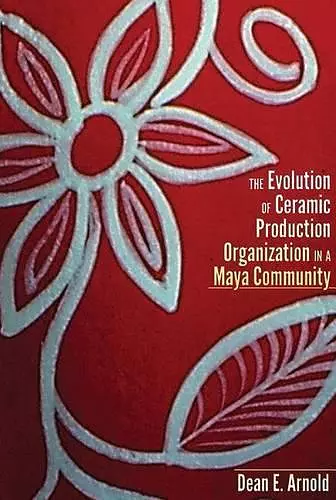The Evolution of Ceramic Production Organization in a Maya Community
Format:Hardback
Publisher:University Press of Colorado
Published:15th Aug '14
Currently unavailable, our supplier has not provided us a restock date

In The Evolution of Ceramic Production Organization in a Maya Community, Dean E. Arnold continues his unique approach to ceramic ethnoarchaeology, tracing the history of potters in Ticul, Yucatán, and their production space over a period of more than four decades. This follow-up to his 2008 work Social Change and the Evolution of Ceramic Production and Distribution uses narrative to trace the changes in production personnel and their spatial organization through the changes in production organization in Ticul. Although several kinds of production units developed, households were the most persistent units of production in spite of massive social change and the reorientation of pottery production to the tourist market. Entrepreneurial workshops, government-sponsored workshops, and workshops attached to tourist hotels developed more recently but were short-lived, whereas pottery-making households extended deep into the nineteenth century. Through this continuity and change, intermittent crafting, multi-crafting, and potters' increased management of economic risk also factored into the development of the production organization in Ticul. Illustrated with more than 100 images of production units, The Evolution of Ceramic Production Organization in a Maya Community is an important contribution to the understanding of ceramic production. Scholars with interests in craft specialization, craft production, and demography, as well as specialists in Mesoamerican archaeology, anthropology, history, and economy, will find this volume especially useful.
"Arnold has now prepared a compelling companion to his 2008 volume, making a quartet of salient publications about pottery and pottery-producing communities. In his new work he blends meticulous diachronic field research with keen insight and documents a substantive theoretical foundation. He draws together the results of many of his previous works, reevaluates and expands upon them, and offers fresh, new cogent analyses and explanations of the dramatic changes that have taken place in the pottery-making community through more than four decades.” —The Society for Archaeological Sciences Bulletin
"This is an outstanding volume that constitutes a major contribution not only to Maya research but to Mesoamerican studies as a whole. Written by a prominent anthropologist and specialist in the study of ceramics, it is remarkable for both the breadth and depth of its research. This book is an original contribution to the general field of cultural anthropology and, more specifically, to archaeology; one that deserves a place on the bookshelves of sociocultural anthropologists, archaeologists, and scholars in related fields, as well as all readers with an interest in the fascinating world of Maya culture, both ancient and modern." —Eduardo Williams, Ph.D., El Colegio de Michoacán, Zamora, Mexico
"Once upon a time, anthropologists embraced the broad study of humankind in the past and present, not merely as a disciplinary stance, but personally in their own work. In his half-century learning about and from the potters of Ticul, Yucatán Dean Arnold has transcended the growing divide between archaeology and sociocultural anthropology in ways few can now claim. Meticulously documented and richly illustrated, The Evolution of Ceramic Production Organization in a Maya Community shows how decisions made by individuals and households in the historical context of changing economic and social conditions in Yucatán affected the intensity, organization and spatial configuration of ceramic production. This book deserves a place next to Arnold's Social Change and the Evolution of Ceramic Production and Distribution in a May a Community on the bookshelf of everyone who is seriously interested in how craft traditions originate, change, and are transmitted across generations." —Christopher Pool, University of Kentucky
"One of the foremost ethnoarchaeologists of Latin America, Arnold is still concerned about how ethnography can contribute to archaeological studies of prehispanic ceramic economies. But this book also has a broader humanistic scope, following the potters and their families over almost 50 years of tumultuous change. . . . Arnold’s book is a testimonial to continuity in a whole community of potters in the face of tremendous social, political, and economic transformation over the last half century. By charting the history of these potters and their families, he provides a unique diachronic account of Maya crafting." —Latin American Antiquity
"[A]n important profile of potters' organization in both time and space that diverges from the ethnoarchaeologists' tendency to emphasize systems of production and their material results . . . With his thorough contextualization of the continuing development of Ticul ceramic production, Arnold encourages deeper ethnoarchaeological consideration of artisans’ individual roles in the development of production organization and socioeconomic complexity, as well as their inherent embeddedness in the social contexts in which they operate." —Technology and Culture
ISBN: 9781607323136
Dimensions: 229mm x 152mm x 25mm
Weight: 621g
352 pages